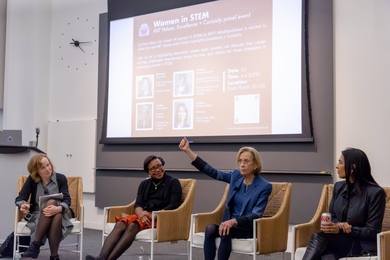Chancellor Phillip L. Clay issued this statement September 27, 2001 to The Tech, which printed it as a column.
Several concerns have emerged in recent days about the draft proposals for implementation of the Dining Plan. I write to acknowledge these concerns, and to share some of my thoughts on how important it is for our community to move forward with substantial improvements to our dining system. We hope in this period of comment to sort out the concerns that will guide the refinement of the current draft. We also want to enhance the student voice in that process.
For a period of nearly twenty years, MIT has failed to develop and sustain a dining plan that supports community and well being. Throughout this time, students have made some valuable accommodation to compensate for MIT's shortcomings. Expectations have been lowered to match the level of investment. For some students, expectations are now so low that our present inadequate system seems worth defending.
Our mission for improving our dining system comes from the Task Force on Student Life and Learning. In 1998 the Task Force proposed and the MIT community agreed that we needed to make substantial improvements in the overall quality, flexibility, and character of dining as part of our larger efforts to build community and improve residential life. The report makes no mention of required participation by students in a dining plan. Our efforts since 1998 to improve dining, however, have shown that until we can count on major student participation in the plan, the operating costs and the basis for investment in upgrading or building dining facilities cannot be made. It is on this basis that we will have minimum participation so that dining vendor will have a stable client base.
Our students deserve a comprehensive approach to dining that supports balanced and healthy living and that is part of what makes the community fabric strong. The plan should contain features that match the different tastes and lifestyles our students have. In order to be sustainable, it should also fit students' budgets and the institute's financial constraints. MIT has committed to make --over the next 3-4 years -- the investment to create a system we can be proud of.
In 2002 we are committed to begin the implementation of a minimum participation program. Minimum participation means that particular students will be required to participate in the dining program. The proposed plans call for full participation on the part of next year's freshman class and no required participation on the part of students who are currently juniors and will be seniors next year. The standards for next year's sophomores and juniors have not been fully established, but we anticipate some flexibility and choice that discussions over the next few weeks will inform.
The concerns we have heard over the last several days reinforce the need for this flexibility and choice. For example, some theme houses have well-established plans for making sure that students in their houses eat as part of their residential programs. This we want to respect. We also know that some dorms have kitchens, and we are looking at how to include this accommodation for those students. For most students, however there are no such choices. We also understand the cost issues and want to make sure we adjust financial aid to match any extra burden the plan imposes. We are very aware that many students have limited degrees of freedom in managing their resources.
Initially, we cannot fully implement a system-wide plan. While we will open one, and perhaps two, dining facilities next year, our overall plan calls for incorporating dining as part of construction and renovation plans going forward. So, the extent of expected participation next year and in the years following will lie in our physical capacity and in our ability to sustain a quality program.
There are several draft options that have been framed to begin the discussion of the dining plan. These options cover a range of areas, and students will have strong views about which of these options would work best for them. We respect these different views, and expect that the next few weeks will provide an opportunity to refine the options so that students can decide which plan offers the most flexibility.
Dean Larry Benedict and members of his office have listened carefully to the students and have informed me of some of the issues that are still a concern in the current draft. They are working hard and will look for opportunities at the Town Meeting and from other sources in the coming weeks to greatly improve the options. It certainly is true that our students are often our most creative problem-solvers, and the input of students will be a valued part of our process as we move forward.
I acknowledge that having been out of the dining plan business for almost two decades and having had a number of false starts, the issue of trust is a legitimate one. To address this issue and maximize student input, I want to note an addition to the process effective immediately. We will add up to 5 additional student members (there are three presently) to the Campus Dining Board. The board will be charged with reviewing comments on the current proposals, refining the options, and designing a process for making a choice among the refined options. The board will also develop a process for opening the vendor interview process to a broader cross section of students. There is not current commitment of a specific vendor for the new plan. Finally, the board will participate in the review of vendor performance, and advise on future implementation issues.
Dining is complex. It is both a business enterprise and a critical student service. Both of these must work. We want to make this process a partnership for those who will benefit from the service. A partnership in the process that involves students as well as staff will produce a dining plan that is first class. We should want nothing less.





